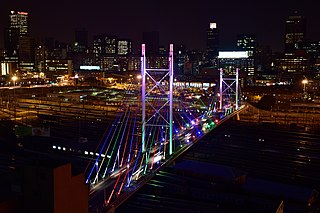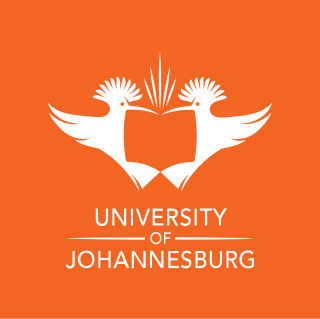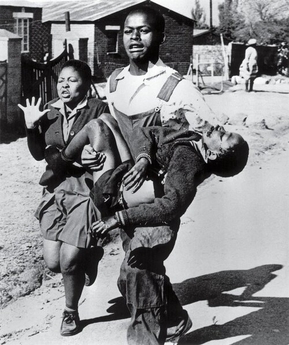
Soweto is a township of the City of Johannesburg Metropolitan Municipality in Gauteng, South Africa, bordering the city's mining belt in the south. Its name is an English syllabic abbreviation for South Western Townships. Formerly a separate municipality, it is now incorporated in the City of Johannesburg Metropolitan Municipality and is one of the suburbs of Johannesburg.

Johannesburg is the most populous city in South Africa with 4,803,262 people, and is classified as a megacity; it is one of the 100 largest urban areas in the world. It is the provincial capital of Gauteng, the wealthiest province in South Africa. Johannesburg is the seat of the Constitutional Court, the highest court in South Africa. Most of the major South African companies and banks have their head offices in Johannesburg. The city is located within the mineral-rich Witwatersrand hills, the epicentre of the international-scale mineral, gold and (specifically) diamond trade.

Kaizer Chiefs Football Club are a South African professional football club based in Naturena, Johannesburg South, that plays in the Betway Premiership. The team is nicknamed AmaKhosi, which means "Kings" or "Chiefs" in Zulu, and the Phefeni Glamour Boys. Chiefs have won 13 league titles and over 42 cup trophies. The club's most recent trophy was the Shell Helix Ultra Cup trophy it won on 12 October 2019. As a result, they hold the most trophies amongst all clubs in South Africa and are the most successful team in South African football history since the start of the top flight in 1970. They are the most supported club in the country, drawing an average home attendance of 16,144 in the 2019–20 season, the highest in the league. It led to them being dubbed "The Biggest Club" in Southern Africa. The team plays its home matches at the 94,797-capacity FNB Stadium.

The University of Johannesburg, colloquially known as UJ, is a public university located in Johannesburg, South Africa. The University of Johannesburg was established on the 1st of January 2005 as the result of a merger between the Rand Afrikaans University (RAU), the Technikon Witwatersrand (TWR) and the Soweto and East Rand campuses of Vista University. Prior to the merger, the Daveyton and Soweto campuses of the former Vista University had been incorporated into RAU. As a result of the merger of Rand Afrikaans University (RAU), it is common for alumni to refer to the university as RAU.

Zolile Hector Pieterson was a South African schoolboy who was shot and killed at the age of 12 during the Soweto uprising in 1976, when the police opened fire on black students protesting the enforcement of teaching in Afrikaans, mostly spoken by the white and coloured population in South Africa, as the medium of instruction for all school subjects. The students wanted to learn in their native languages, Xhosa and Zulu. A news photograph by Sam Nzima of the mortally wounded Pieterson being carried by another Soweto resident while his sister ran next to them was published around the world. The anniversary of his death is the designated Youth Day in South Africa.
The following lists events that happened during 1984 in South Africa.
The following lists events that happened during 1988 in South Africa.
The following lists events that happened during 1987 in South Africa.

The City of Johannesburg Metropolitan Municipality is a metropolitan municipality that manages the local governance of Johannesburg, the largest city in South Africa. It is divided into several branches and departments in order to expedite services for the city. Zulu is the most spoken home language at 23.4% followed by English at 20.1%.

The Soweto uprising, also known as the Soweto riots, was a series of demonstrations and protests led by black school children in South Africa during apartheid that began on the morning of 16 June 1976.
In South Africa, a metropolitan municipality or Category A municipality is a municipality which executes all the functions of local government for a city or conurbation. This is by contrast to areas which are primarily rural, where the local government is divided into district municipalities and local municipalities.

Orlando Stadium is a multi-purpose stadium in Soweto, a township in Johannesburg, in Gauteng province in South Africa. It is the home venue for Orlando Pirates Football Club, a professional soccer team that plays in the Premier Soccer League and owned by the City of Johannesburg.

Amandla!: A Revolution in Four-Part Harmony is a 2002 documentary film depicting the struggles of black South Africans against the injustices of Apartheid through the use of music. The film takes its name from the Zulu and Xhosa word amandla, which means power.
The World, originally named The Bantu World, was the black daily newspaper of Johannesburg, South Africa. It is famous for publishing Sam Nzima's iconic photograph of Hector Pieterson, taken during the Soweto uprising of 16 June 1976.
Where the Hell is Matt? is an Internet phenomenon that features a video of Dancing Matt doing a dance "jig" in many different places around the world in 2005. The video garnered popularity on the video sharing site YouTube. There are now five major videos plus two outtakes and several background videos on YouTube. Matt dances alone in the first videos. In 2008 others join with him doing the dance "jig"; in 2010 he does the Diski Dance in South Africa. In 2012 he works with other dancers, sometimes using a local dance or another dance step.

Orlando Power Station is a decommissioned coal-fired power station in Soweto, South Africa. The power station was commissioned at the end of the Second World War and served Johannesburg for over 50 years.
Mamela Nyamza is a dancer, teacher, choreographer, curator, director and activist in South Africa. She is trained in a variety of styles of dance including ballet, modern dance, African dance, the Horton technique, Spanish dance, jazz, movement and mime, flying low technique, release technique, gumboot dance and Butoh. Her style of dance and choreography blends aspects of traditional and contemporary dances. Nyamza has performed nationally and internationally. She has choreographed autobiographical, political, and social pieces both on her own and in collaboration with other artists. She draws inspiration from her daily life and her childhood growing up in Gugulethu, as well as her identity as a homosexual, Black, South African woman. She uses her platform to share some of the traumas faced by South African lesbians, such as corrective rape. Additionally, she has created various community outreach projects that have spread dance to different communities within South Africa, including the University of Stellenbosch's Project Move 1524, a group that uses dance therapy to educate on issues relating to HIV/AIDS, domestic violence and drug abuse.

Moitheri Pheto is a South African actress who is known for starring in an Oscar-winning film Tsotsi (2005) and other South African soapies. She had a recurring role of a heart surgeon, Dr. Malaika Maponya, on the American soap opera The Bold and the Beautiful. Terry Pheto is among a group of individuals and companies implicated in the National Lotteries Commission corruption scandal.
Sydney Hall is an American actor, model and dancer.

The apartheid regime in South Africa began in 1948 and lasted until 1994. It involved a system of institutionalized racial segregation and white supremacy, and placed all political power in the hands of a white minority. Opposition to apartheid manifested in a variety of ways, including boycotts, non-violent protests, and armed resistance. Music played a large role in the movement against apartheid within South Africa, as well as in international opposition to apartheid. The impacts of songs opposing apartheid included raising awareness, generating support for the movement against apartheid, building unity within this movement, and "presenting an alternative vision of culture in a future democratic South Africa."












